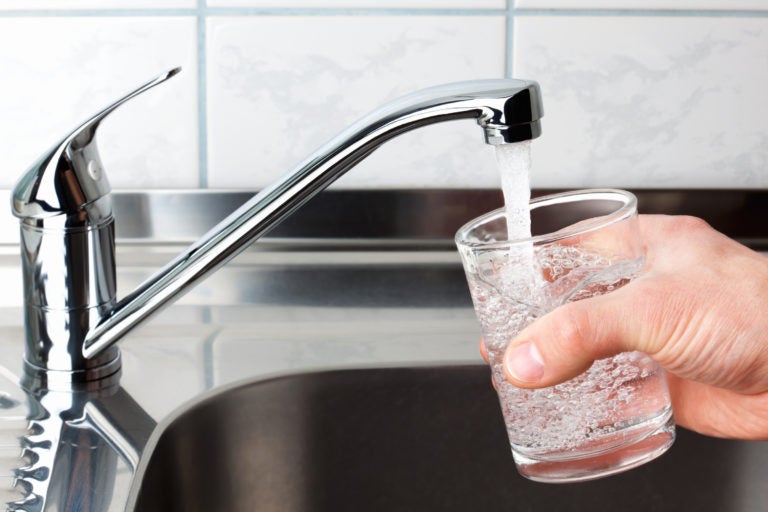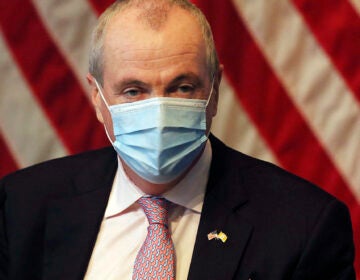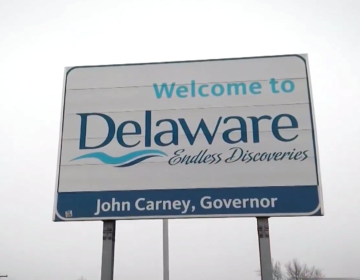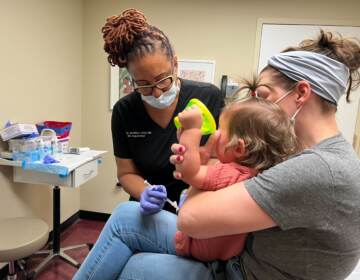Coronavirus update: Philadelphians struggling to pay water bills get a reprieve
Philadelphians who are behind on their water bills don’t have to worry about the city shutting off service until at least July 10.

(Shutterstock)
Updated at 5:10 p.m.
–
Are you on the front lines of the coronavirus? Help us report on the pandemic.
Pennsylvania had 1,126 new positive COVID-19 cases Thursday, and a 1.65% increase in total cases over the previous day. Over the past seven days, the commonwealth has recorded an increase of 6,147 cases, or 9.74%.
The state has recorded 69,252 positive cases.
Statewide, Pennsylvania had 99 new deaths as of Thursday, for a total of 4,869. The Department of Health says this is the result of “continued work to reconcile data from various sources,” and that the deaths have occurred “over the past several weeks.”
Philadelphia reported 341 new positives Thursday. The city has recorded 20,700 cases so far, and 1,165 deaths.
Philadelphians struggling to pay water bills get a reprieve
Philadelphians who are behind on their water bills don’t have to worry about the city shutting off service until at least July 10.
The city water department announced Thursday that it is extending assistance for customers having trouble paying. It had already extended its shutoff moratorium once, with the previous order set to expire on June 1.
The department said its move is designed to align with Governor Tom Wolf’s executive order shielding Pennsylvanians from eviction and foreclosure.
“The health and safety of customers is our top priority,” Commissioner Randy Hayman said in a statement. “Access to clean water is an essential part of public health.”
The department said it had restored water service to more than 15,000 accounts as of March 16, when the pandemic began hitting the city in earnest.
Officials noted, people who hold service accounts are still technically required to pay their bills, and “should do so if possible,” as water bills help fund city infrastructure.
People who have difficulty paying can apply for assistance on the city’s website.
About 5,000 Philly kids still lack internet access
Just over 5,000 Philadelphia public school students have requested mobile internet hotspots because they do not have internet access, according to Superintendent William Hite.
That number represents about four percent of school district students.
The district purchased 2,500 hotspots to distribute, but it’s unclear how it will ensure internet connectivity for the rest of the families who’ve requested help. Hite said Thursday that internet access for school children needs to be treated more like a public utility, particularly in emergency situations that require online learning.
“People look to us as school districts to solve this problem,” said Hite. “It would be like the school district must solve the problem of getting electricity to houses or water to houses. We can’t take on that problem, too.”
Hite said the district had asked several telecom companies — including Comcast, Verizon, and AT&T — for help bridging the digital divide. He acknowledged that Philadelphia-based Comcast has made steps to increase internet access during the coronavirus crisis.
Those steps include temporarily making public wifi hotspots free and offering its internet essentials service for free to low-income families.
“We’re proud to have connected more than 8 million low-income people nationally to the internet, including more than 290,000 in Philadelphia, through the program,” said a company spokesperson. “But solving a problem as vast as the digital divide cannot be the responsibility of one company alone. The City, school district, elected officials, nonprofit community partners and other private-sector companies need to join in and help solve this problem and find a solution.”
Verizon and AT&T did not immediately respond to requests for comment.
‘We want people to stay home’
With the start of the Memorial Day weekend just a day away, Pennsylvania Health Secretary Rachel Levine said Thursday that residents should ignore the temptation to hit the Jersey Shore, which reopened last weekend.
Levine also advised against making travel plans within the state, especially for residents considering weekend or day trips that would take them from a “red” county to a “yellow” county under the state’s color-coded reopening plan.
“We want people to stay home,” said Levine during a virtual news conference. “If the weather is nice this weekend, going outside in your immediate area is fine. If you’re going to be in contact with other people, please wear a mask, please practice social distancing.”
On Friday, 12 more counties will move from “red” to “yellow.” Philadelphia and the surrounding suburbs are not among them.
Adams, Beaver, Carbon, Columbia, Cumberland, Juniata, Mifflin, Perry, Susquehanna, Wyoming, Wayne and York counties will join the 37 counties that have begun reopening since May 8.
As of Friday, 49 of Pennsylvania’s 67 counties will be in the yellow phase.
Stay-at-home and shutdown orders in the remaining red counties will be in place until at least June 4.
Philadelphia officials say COVID-19 cases are continuing a downward trend
Philadelphia officials are reporting that they’re “getting closer” to being able to start reopening. However, they still don’t have a date when that might happen.
New cases in the city have been trending downward, according to Health Commissioner Thomas Farley. The day-over-day increase on Thursday, 341, was notably higher than the previous day’s, but Farley attributed it to an influx in lab reports.
Hospitals in the city, he said, now have 623 inpatients with the virus. There are 1,202 inpatients in the entire southeast region.
Mayor Jim Kenney said he’s beginning to turn his attention to figuring out which of the city’s summer programs will be able to operate. Many are in limbo, but he said he knows for sure that at least one will go forward — the city Parks and Recreation Department’s Playstreets program, which involves community members having city streets officially shut down, and handing out city-provided meals to children and young people. Kenney urged parents and community leaders to volunteer to be Playstreets supervisors.
Kenney also addressed one of the issues that has lately become a point of contention in the city — the group of roughly 100 homeless people who have formed an encampment in the Philadelphia International Airport.
City officials, Kenney said, have been negotiating with homeless advocates about how to move the people in the encampment to some form of congregant shelter. The advocates want every person to receive a COVID-19 test before being moved, to avoid an outbreak. They have threatened a lawsuit if the city doesn’t follow through.
Kenney said he’s amenable to the idea, but isn’t sure where the homeless people in the encampment would be able to be housed while waiting for tests. He said he doesn’t want them staying with the airport, as he’s trying to “balance” the safety of the workers and people who need to use it, with the well-being of the homeless people.
Some members of Philadelphia’s City Council have lately pushed back at Kenney’s plan to fill part of Philadelphia’s sudden, pandemic-induced budget deficit with increases to three taxes: the city’s non-resident wage tax, parking tax, and school property tax. He has estimated that those increases would cover about $50 million of the roughly $650 million hole.
At Thursday’s press conference, he held firm.
“Certainly, Council has an important role in this,” he said. “If Council feels that they want to find the money somewhere else, they certainly have the right to put that forward. The problem is, it has to be real.”
Montco commissioners address discrepancy in nursing home case numbers
Montgomery County officials say the county has identified 94 new COVID-19 cases in the past day, for a total of 6,213 cases since the pandemic began. Ten more county residents have died, for a total 558 coronavirus-related deaths.
At the county’s press conference Thursday, Chair of Commissioners Val Arkoosh acknowledged that there have been issues with the state Department of Health’s tracking of coronavirus infection rates in nursing homes — including one Montgomery County facility that the state reported had 40 new infections, but had actually merely provided outpatient care to 40 COVID-19-positive patients who were discharged from the hospital.
The state also said 16 residents at the facility died, but the facility says only three did.
Arkoosh confirmed, Montgomery County’s own numbers of COVID-19 cases in nursing homes are lower than the state’s.
Because those cases make up a significant portion of the county’s total cases, Arkoosh said she has asked the state if they will base reopening decisions on the county’s numbers, not its own.
“That is our hope,” she said, adding that she has gotten “some indication” that the state will consider the request.
Arkoosh also noted that Gov. Wolf recently signed a bill allowing for the temporary sale of cocktails-to-go by businesses that already have a liquor license, and which have lost a significant amount of their business.
She encouraged Montgomery County residents to “drink responsibly” over the Memorial Day weekend.
Partisan tension between the county’s one Republican commissioner, Joe Gale, and its two Democratic commissioners has bubbled to the surface several times over the course of the pandemic. On Thursday, the issue was elections.
The county’s Democratic majority has been strongly encouraging residents to vote by mail in the upcoming June 2 primary, and has recently moved authorize the installation of mail-in-ballot collection boxes across the county.
Gale said he is “very disappointed” with this move and, when he took his turn to speak, urged voters to do exactly the opposite: vote in-person, pandemic notwithstanding.
“I don’t trust the mail process,” he said. “Time and time again … there’s been a lot of problems, and we can see more problems happening in Montgomery County.”
Gale said these problems, in his estimation, include the fact that the county is outsourcing the mailing of absentee ballots, and anecdotal reports of slow ballot deliveries and other confusion about absentee voting.
The county’s other commissioners have urged absentee voting in an effort to prevent long lines and crowding at the polls, and because they’ve had to significantly consolidate polling places due to a dearth of available poll workers, and normal polling locations, like nursing homes, being locked down due to coronavirus outbreaks.
WHYY’s Aaron Moselle and Avi Wolfman-Arent contributed reporting.

Get daily updates from WHYY News!
WHYY is your source for fact-based, in-depth journalism and information. As a nonprofit organization, we rely on financial support from readers like you. Please give today.





![CoronavirusPandemic_1024x512[1]](https://whyy.org/wp-content/uploads/2020/03/CoronavirusPandemic_1024x5121-300x150.jpg)


